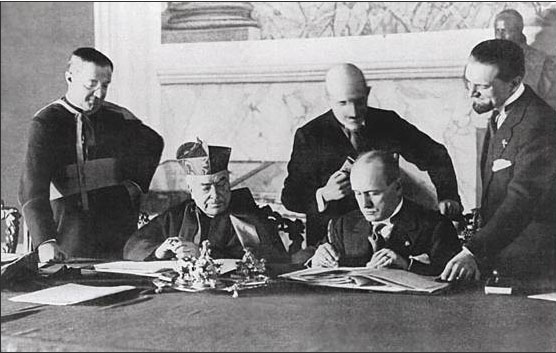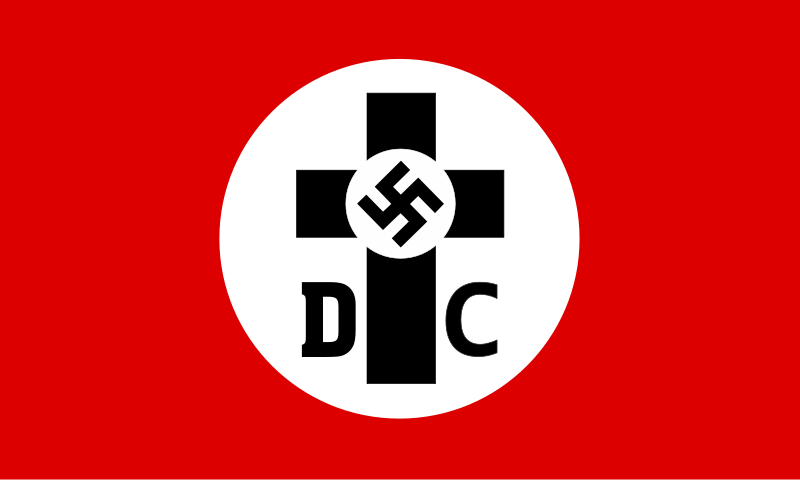Clement Pulaski
Daily Stormer
May 23, 2014

The Jew-run Conservative establishment constantly promotes the message that National Socialism and Fascism were inherently anti-Christian. I will leave aside the ridiculous argument that anti-semitism is somehow anti-Christian (as theological anti-semitism is in fact a requirement for all Christians), and focus instead on legitimate concerns expressed by Christians who lived under these regimes.
Given that these Christians did make formal complaints about certain Fascist/National Socialist policies, it is necessary for every Bible-believing Christian to examine these complaints, and seriously consider whether or not his faith is compatible with Fascism as a political system.
But before looking at any of the details, I would like to point out that the Axis regimes of the 1930s are the most slandered and distorted in modern history. In fairly evaluating these governments, we must keep in mind that much of the information we have about them was written by victorious Jews, and is therefore suspect. If any of our readers question the truth of any factual statements found in this article, please let us know.
The most important episode for an investigation of Christianity and National Socialism is undoubtedly the Declaration of Barmen. Nathanael Strickland at Faith and Heritage recently published an excellent article explaining the background of the Declaration and the theological issues involved:
Positive Christianity is a theology emerging from the late nineteenth-century higher criticism, itself beginning to coalesce in Germany in the early part of the twentieth century. Higher criticism places reason and rationality above the truth of Scripture, makes biblical truth subjective, and seeks to divide the historical Jesus from the divine Jesus. All manner of liberal heresies have their root in this attack on the inerrancy of Scripture. But Positive Christianity takes higher criticism in another direction. Rather than the story of Jesus being God’s plan to bring salvation to a fallen world, the New Testament became the story of an Aryan Jesus sent to combat Jewish power. Positive Christianity thus sought to deemphasize the Old Testament, to remove what its advocates viewed as the Semitic, non-German elements of Christianity from the German Church, and to reimagine Jesus as an Aryan superman. Some of the smaller, more radical elements of Positive Christianity wanted to entirely remove the Old Testament and parts of the New Testament, replacing them with elements from Germanic paganism and Vedic Hinduism, thus creating a new syncretistic and purely Aryan religion. Positive Christianity is rightly considered as apostasy by both Protestants and Catholics.
Proponents of Positive Christianity in the German Church referred to themselves as “German Christians” [Deutsche Christen]…
Prior to 1933, there were twenty-eight regional Protestant church organizations in Germany under a loose federation. In April 1933, the leadership of the federation agreed to write a new constitution forming a new and more centralized national church. However, the goal of those pushing for such a move was not simply to reorganize into a better or more efficient structure, but to use this as an opportunity to have the Deutsche Christen seize control of the entire Protestant German Church and then to transform it into a subservient arm of the German state. But the Deutsche Christen candidate, Ludwig Müller, was soundly defeated in the election for Reichsbischof position as head of the new church. Outraged by the results, the German political government usurped the jurisdiction of the church and forced the duly elected Reichsbischof to resign in favor of Müller in September 1933. Müller began to immediately put the Deutsche Christen platform into effect by executively defrocking the handful of racially Jewish Christian pastors, stripping his political opponents of their positions, and even having some of the higher-ranking ones arrested. In November 1933, the Deutsche Christen held a rally at which speakers openly advocated removing all noncompliant pastors from their office, expelling all racially Jewish Christian converts from the church, removing the Old Testament from the Bible, eliminating all non-German elements from church services, and adopting the narrative of an Aryan Jesus fighting corrupt Jewish forces.
Rather than rallying and unifying the Protestant German church, however, these moves rightly appeared to many German Protestants as an imposition of the national socialist political program upon the church, corrupting and attacking the authority of Scripture and the autonomy of the church. The opposition to Müller and the Deutsche Christen called themselves the “Confessing Church.” While they did not officially break with the national German church, they asserted that Müller had no authority over them or right to speak for them. In response to the continued aggressiveness from Müller and the Deutsche Christen, leaders from the Confessing Church met in Barmen in May 1934 to formulate an official response. The result of this was the Theological Declaration of Barmen.
Strickland paraphrases the main content of the Declaration with the following six points:
1. Jesus Christ is as He is presented in Scripture, and He is the only Word of God. There are no other sources of God’s revelation.
2. Jesus is the supreme Lord over every single aspect of the Christian’s life. There is no area of life where another authority supersedes His.
3. The Christian Church was instituted by God and receives its form, mission, and message solely from God and Scripture. The Church may not alter any of that to suit the political ideology of the day.
4. The leaders of the church are shepherds meant to minister to the sheep. They are not meant to be political leaders to rule over them.
5. The state is divinely appointed to administer justice and promote peace, but the state is also called to rule in a godly manner and to remain inside its God-appointed jurisdiction. The state has no authority to exceed its jurisdiction and subsume the responsibilities of the church. Likewise, the church has no authority to exceed its jurisdiction and take on the functions of the state as its religious arm.
6. The church’s primary responsibilities are the preaching of the Word and the administration of the sacraments. This mission must not be hijacked in favor of a political program.


If the facts as presented by Mr. Strickland are accurate, then there is no doubt that all true Christians must affirm the Declaration of Barmen and condemn both the Deutsche Christen and those in the Third Reich who supported them. While the Barmen Banner will be shocking and offensive to many of our readers, I must emphasize that given the circumstances, the sentiment that it expresses is completely justified. Everything must be made subject to Christ our Lord, and any who would edit the Bible for political purposes must be seen as anti-Christs.
As a quick aside, it is worth noting that the efforts of the Deutsche Christen directly contradict the very sage advice given by Hitler in Mein Kampf:
Political parties have no right to meddle in religious questions except when these relate to something that is alien to the national well-being and thus calculated to undermine racial customs and morals.
If some ecclesiastical dignitaries should misuse religious ceremonies or religious teaching to injure their own nation their opponents ought never to take the same road and fight them with the same weapons.
To a political leader the religious teachings and practices of his people should be sacred and inviolable. Otherwise he should not be a statesman but a reformer, if he has the necessary qualities for such a mission.
Any other line of conduct will lead to disaster, especially in Germany.
Therefore, there seem to be three options when determining Hitler’s attitude towards the Deutsche Christen. Either he was being insincere in Mein Kampf, he had changed his mind by the 1930s, or he did not have complete control over everything that was done in the Reich. I am unable to say exactly which of these alternatives is the case.
Strickland’s main concern with the Declaration is to show that while it does condemn certain actions of the National Socialist government, it does not condemn ethno-nationalism itself. Strickland is content to leave the argument there, having shown that kinism (the version of ethno-nationalism that he promotes) is compatible with the Barmen Declaration.
However, I would take this conclusion further: while the Barmen Declaration condemns certain anti-Christian elements within the Third Reich, it does not condemn National Socialism as a political or economic system. Therefore, one can at the same time affirm the Barmen Declaration and approve of the National Socialist system as put forth in the writings of Adolf Hitler and Gottfried Feder. There is much wisdom in this system, wisdom which we are in need of today.
When looking at Fascism/National Socialism from a wider historical perspective, it is clear that traditional Christianity can co-exist with it. While German National Socialism unfortunately had a strong neo-pagan faction, the situation in Fascist Italy was more positive when it came to Church-State relations. The Vatican and the Fascist Government reached an agreement known as the Lateran Treaty in 1929. This agreement defined the different spheres of authority which the Catholic Church and the Italian government were to enjoy. While there were some disputes between the state and the Catholic Church, these were quite minor compared with the egregious actions of the Deutsche Christen, and the situation in Italy presents a good model for how Christianity and Fascism can be compatible.
From Mussolini’s The Political and Social Doctrine of Fascism:
The Fascist State is not indifferent to the fact of religion in general, or to that particular and positive faith which is Italian Catholicism. The state professes no theology, but a morality and in the Fascist State religion is considered as one of the deepest manifestations of the spirit of man; thus it is not only respected but defended and protected. The Fascist State has never tried to create its own God, as at one moment Robespierre and wildest extremists of the Convention tried to do; nor does it vainly seek to obliterate religion from the hearts of men as does Bolshevism: Fascism respects the God of the ascetics, the saints and heroes, and equally, God as He is perceived and worshipped by simple people.
I unhesitatingly condemn the un-Christian actions of the Fascist and National Socialist governments, including any attempt to alter the Christian faith, the implementation euthanasia programs, or pressure to dissolve mixed-race marriages. The truth of Scripture, the sanctity of innocent life, and the firm union of marriage, these are things which Christians must defend, no matter what form of government they live under. But it does not follow that the particular governments that have promoted these un-Christian measures are based on false principles.
On the FAQ page at Faith and Heritage, the editors of the site explain National Socialism as a flawed but largely justified reaction to the degeneracy of the Weimar Republic, a degeneracy which German conservatives failed to stamp out. While this is partly true, it does not present the entire picture. Fascism/National Socialism did not emerge exclusively as a response to post WWI chaos; it emerged as a response to the centuries-long failure of “conservatives” and hereditary aristocrats to deal with usury-based industrial capitalism. The exploitative nature of this capitalist system not only brought much misery to the poor, but also created an opening for Marxist subversion.

In Mein Kampf, Hitler relates the absolute failure of bourgeois business owners to comprehend the need for unity between German bosses and workers. All they cared about was their money and maintaining the status quo. This is why the conservatives failed; not because of a momentary lapse of judgment, but because of a fundamental flaw in their world-view.
Fascism remains the only political ideology to make any progress in defeating both usury and communism, and it is the only positive political development in the entire post-French Revolution West. If we can embrace any of its essential doctrines without violating our Christian faith, then we must do so. All systems of government, from monarchies to communist collectives, have interfered with the workings of the Church. If we were to reject every form of government whose leaders have at some time persecuted the Church, there would remain no form of government of which we could approve.
